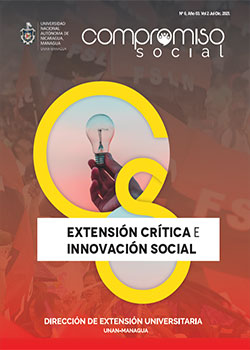The school garden as a tool for environmental awareness for learning and food improvement in rural communities
DOI:
https://doi.org/10.5377/recoso.v3i6.13527Keywords:
Productive diversification, food, education, orchards, sustainabilityAbstract
In this sense, the National Autonomous University of Nicaragua UNAN-Managua, in its Multidisciplinary Regional Faculty of Chontales (FAREM-Chontales), following the reasoning raised, has developed an initiative to support the Ministry of Education which has harmonized the objectives and methodology work for the implementation of School Gardens in two schools in San Miguelito community, Juigalpa, Chontales department, Nicaragua, benefiting 69 young people in multigrade per meeting in high school with ages ranging between 14 and 20 years and 20 day multigrade children with ages ranging from 5 to 13 years and 18 university students. From the university, three principals have been appropriated: the acquisition of knowledge, the creation of habits and the development of communication, especially in the rural context, which is a universe of knowledge and wisdom that can be used towards the protection of consciousness, the diversity of senses of the social collective, to the socio-productive conditions that can be added to the development of educational objectives at all levels, to influence the improvement of educational quality, productive diversity and diet, ensuring food and nutrition to the peasant family. As a training model, young women and community members were included in the kitchen, to show in a practical way the benefits of the different parts of the crops, the nutritional content, as well as a good taste: “The garden serves us for many things, learn new things, take advantage of the soil, learn to cultivate the patios to have a good diet that helps us develop healthy and healthy that helps us physically and mentally”. This educational experience shows that it is possible to adopt substantial changes in the thinking of the society of the urban sector and the rural countryside and to live in accordance with nature.
Downloads
References
Agulló Díaz, C., & Payà Rico, A. (2018). Democracia, renovación pedagógica y territorio rural: la escuela agrícola comarcal valenciana ‘La Serranía’. Historia y Memoria de la Educación, 299-334. Obtenido de https://doi.org/10.5944/hme.7.2018.18742
Armienta, M. D., Keck, C., Ferguson, B. G., & Saldivar, M. A. (2019). Huertos escolares como espacios para el cultivo de relaciones. Innovación Educativa, 161-178. Obtenido de http://www.scielo.org.mx/pdf/ie/v19n80/1665-2673-ie-19-80-161.pdf
Barrón Ruiz, Á., & Muñoz Rodríguez, J. M. (2015). Los huertos escolares comunitarios: fraguando espacios socioeducativos en y para la sostenibilidad.Foro de Educación, (págs. Foro de Educación, 13(19), 213-239.). doi:doi: http://dx.doi.org/10.14516/fde.2015.013.019.010
Barbosa Herrera, J. C., & Rodríguez Villabona, M. y. (2010). Action Research in Higher Education with ICT Incorporation. One way of assessing and transforming the educational proposals. Barcelona.
Botella, A., Hurtado, A., & Cantó, J. (2017). El huerto escolar como herramienta innovadora que contribuye al desarrollo competencial del estudiante universitario. Vivat Academia Revista de Comunicación, 19-31.
Ceballos, M. (2017). «Aprovechamiento didáctico de los huertos escolares en centros de Sevilla». (2. (. Nº Extra 0, Ed.) Enseñanza de las ciencias: revista de investigación y experiencias didácticas, p. 787-792. Obtenido de <https://ddd.uab.cat/record/184560>
Colina, L. (2013). Educación rural y desarrollo endógeno sustentable. Revista Vinculando. Obtenido de http://vinculando.org/articulos/sociedad_america_latina/educacion-rural-y-desarrollo-endogenosustentable.html
Espinet, M., & Rekondo, M. (2017). El papel de la maestra de educación primaria en la construcción de la competencia eco-ciudadana en el huerto escolar. Enseñanza de las ciencias: revista de investigación y experiencias didácticas., 793-798.
FSLN, D. N. (1989). Programas y proclamas del Frente Sandinista de Liberación Nacional. Managua: Vanguardia.• Glover, T. D., Shinew, K., & Parry, D. C. (2005). Association, sociability, and civic culture: the. Leisure Sciences, 75-92.
GREDOS. (2018). Educación en los Objetivos de Desarrollo Sostenible (ODS) de la Agenda 2030, a través de la red de huertos escolares comunitarios HecoUSAL. MEMORIA DE EJECUCIÓN DE ACTUACIONES (Ref. ID2018/023). Salamanca: Gestión del Repositorio Documental de la Universidad de Salamanca.
LabVida. (2015). Huertos escolares para la construcción comunitaria de sistemas agroalimentarios sustentables. Obtenido de Red Internacional de Huertos Escolares: https://www.redhuertos.org/
Larrosa, F. J. (2013). Huertos escolares de la región de Murcia. Murcia: Universidad de Murcia.• Llerena, G., & Espinet, M. (2017). Agroecología escolar. Barcelona: Polen.
Merçon, J. (2018). Semillas comunitarias y redes agroecológicas en Veracruz. EcoSur: EcoFronteras, 18-20. Obtenido de https://revistas.ecosur.mx/ecofronteras/index.php/eco/article/view/1826/1806
MINED. (2008). Huertos Escolares: Herramienta para el desarrollo y la. Plegable, MINED, FAO, PINE, PESA, Managua. Obtenido de https://coin.fao.org/coin-static/cms/media/14/13540576542210/plegable_huertos_escolares_2008_uv_02.pdf
Ratcliffe, M., Merrigan, K., & Rogers, B. ,. (2011). The effects of school garden experiences on middle school-aged students’ knowledge, attitudes, and behaviors associated with vegetable consumption. Health Promotion Practice, 36-43. doi:doi: 10.1177/1524839909349182.
Rodríguez- Marín, F., Fernández- Arroyo, J., Puig-Gutíerrez, M., García-Díaz, J. E. (2017). Los huertos escolares ecológicos, un camino decrecentista hacia un mundo más justo. Enseñanza de las Ciencias(Extraordinario), 805-810. Obtenido de https://core.ac.uk/download/pdf/158654785.pdf
Tapella, E., & Rodriguez-Bilella, P. (2014). Sistematización de experiencias: Una metodología para evaluar intervenciones al desarrollo. Revista de Evaluación de Programas y Políticas Públicas, 80-116. Obtenido de https://ri.conicet.gov.ar/bitstream/handle/11336/51512/CONICET_Digital_Nro.b2b5ff6b-720b-428a-bf8a-22d143aa4184_A.pdf?sequence=2&isAllowed=y
Toledo, V. (2003). Ecología, espiritualidad y conocimiento. México, PNUMA y Universidad Iberoamericana.
Vía Campesina. (2018). Una breve historia de los orígenes de la agricultura, la domesticación y la diversidad. Revista Biodiversidad. Obtenido de https://www.grain.org/es/entries/6080-una-brevehistoria-de-los-origenes-de-la-agricultura-la-domesticacion-y-la-diversidad-de-los-cultivos
Downloads
Published
How to Cite
Issue
Section
License
Copyright (c) 2021 Universidad Nacional Autónoma de Nicaragua, Managua (UNAN-Managua)

This work is licensed under a Creative Commons Attribution-NonCommercial-ShareAlike 4.0 International License.




